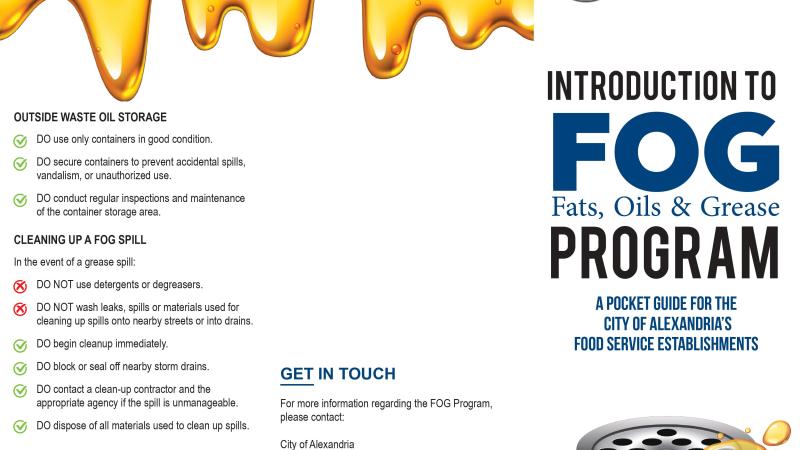FOG Program
Fats, Oils and Grease (FOG) Program
The City has developed a Fats, Oils and Grease (FOG) program to reduce the amount of FOG introduced into the sanitary sewer system, which can lead to sewer back-ups and sanitary sewer overflows into the environment. This program was initiated in 2019 and included outreach to food service establishments (FSEs) on how to best control FOG from entering the sewer system due to cooking and other food preparation activities.
As part of the City’s program aimed at reducing FOG into the sanitary sewer system, the City amended the City Code by including a new section (Subdivision D of City Code Title 5, Chapter 6, Division 3.1 – Pretreatment of Wastewater) to provide FOG requirements for owners of FSEs. Although the discharge of FOG was already prohibited in the City Code, the new section provides additional clarification on FSE requirements, City’s authority to inspect FSEs for FOG, compliance schedules, and penalties for non-compliance.
For any questions about the ordinance, please contact Suzanne Salva at 703.746.4059.
FOG Program: Frequently Asked Questions
What is FOG and where does it come from?
-
FOG (Fats, Oils and Grease) are by-products generated from food preparation and cooking; including liquid and solid cooking oil, meat fat, shortening, sauces and dairy products.
Why is FOG a problem?
-
FOG in sewers can cause blockages in the sanitary sewer collection system and cause sewer backups and overflows.
What can FSEs do to prevent FOG from entering sewers?
-
Installation of grease recovery devices including grease traps and interceptors, using best management practices of scraping food wastes into the trash, regular maintenance of grease recovery devices and training kitchen staff.
Why is the City updating its ordinance related to FOG?
-
A new section (Subdivision D of City Code Title 5, Chapter 6, Division 3.1 – Pretreatment of Wastewater) specifically addresses FOG for both new and existing food service establishments. The updated section clarifies FOG management requirements, clarifies the City’s authority to inspect for FOG, provides minimum maintenance and record keeping requirements; provides a compliance schedule and clarifies civil penalties.
Will my food service establishment be inspected?
-
FOG inspection of food service establishments will resume in 2022.
How can I get in compliance?
-
The City FOG inspector will provide guidelines for getting in compliance and reducing or eliminating FOG from entering the plumbing. City FOG inspector will check if food service establishments have proper grease control devices and are using and maintaining them correctly. Facilities that do not have grease control devices may be required to install them. Inspectors will also check that establishments have procedures for handling FOG and cleaning grease control devices.
What if I don’t get in compliance?
-
Establishments that fail to comply with FOG management policies and continue to discharge FOG to the City sewers may be required to install additional grease-removal equipment or be fined.
